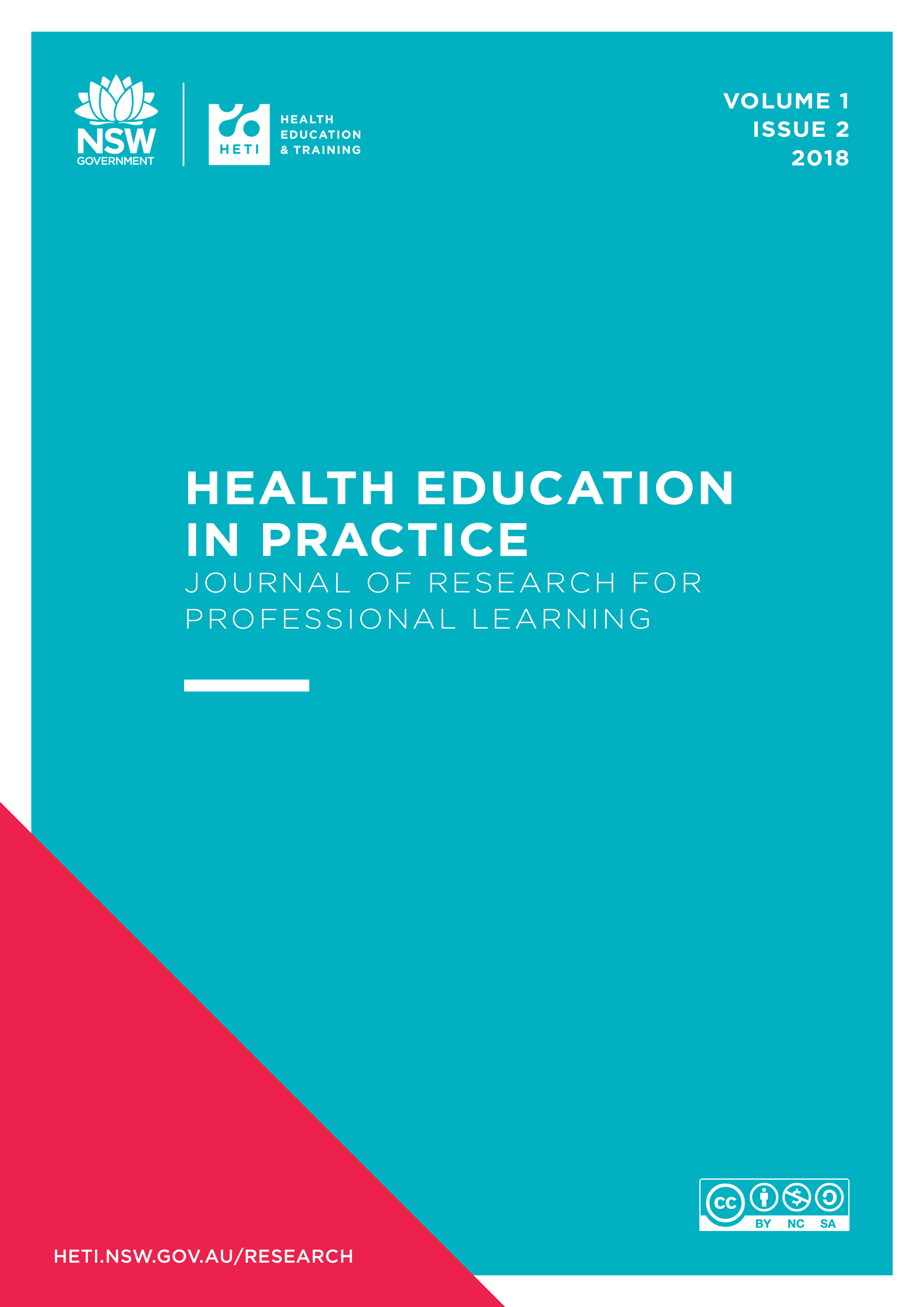Curriculum resource co-design and development for a digital health workforce and digital health ready graduates
Abstract
Demand for an eHealth capable workforce is highlighting the need for eHealth education and training across tertiary education and workforce professional development contexts. NSW Health and the University of Sydney have collaborated to develop learning resources as a component of a comprehensive Digital Health Curriculum for NSW Health. Learning resource development is guided by the eHealth Capabilities Framework and the NSW Health Analytics Framework, to produce a Massive Open Online Course (MOOC) relevant to the health workforce and health degree graduates. A co-design process, involving broad stakeholder and subject matter expert consultation from across health, education, government and non-government organisations, is being applied to develop quality learning resources. Initial learning opportunities focus on the foundation level digital health capabilities anticipated of the health workforce. In addition, there is a focus on discussions regarding future curriculum development activities at the level of intermediate and advanced level capabilities relevant to workforce in leadership roles or seeking career opportunities specialising in the growing professional fields of digital health and data analytics.
Editorial note
The journal editorial team acknowledges that the editor-in-chief, Dr Suzana Sukovic, is a co-author of the paper, ‘Curriculum resource co-design and development for a digital health workforce and digital health ready graduates’ (McGregor et al.). As outlined in journal polices, Dr Sukovic was not involved in any aspect of the editorial process. Blind peer-reviewing was managed by the Journal Manager and all other aspects of the publishing process were managed by the editorial team, excluding editor-in-chief. This practice follows the recommendations by COPE (https://publicationethics.org/).
Article submitted: 31/8/2018
Article accepted: 6/11/2018
Publish date: 17/12/2018
Downloads
References
Anders, A 2015, ‘Theories and Applications of Massive Online Open Courses (MOOCs): The Case for Hybrid Design’, International Review of Research in Open and Distributed Learning, vol. 16(6), viewed 21 October 2018, http://www.irrodl.org/index.php/irrodl/article/view/2185/3526
Australian Digital Health Agency 2018, Australia’s National Digital Health Strategy: Safe, Seamless and Secure, viewed 21 October 2018, https://conversation.digitalhealth.gov.au/workforce-and-education
Brunner, M, McGregor, D, Keep, M, Janssen, A, Spallek, H, Quinn, D, Jones, A. Tseris, E, Yeung, W, Togher, L, Solman, A & Shaw, T 2018, ‘An eHealth Capabilities Framework for Graduates and Health Professionals: Mixed-Methods Study’, Journal of Medical Internet Research, vol. 20, e10229.
Churchill, D 2007, ‘Towards a useful classification of learning objects’, Educational Technology Research and Development, vol. 55: 479–497.
Consumers Health Forum of Australia 2018, Going Digital to deliver a healthier Australia: A health policy report, viewed 21 October 2018, https://chf.org.au/sites/default/files/gdigital_report_j060618.pdf
Coursera 2018, eHealth: More than just an electronic record, viewed 22 August 2018, https://www.coursera.org/learn/ehealth.
Department of Health and Aging 2011a, The eHealth Readiness of Australia’s Allied Health Sector, viewed 21 October 2018, http://www.health.gov.au/internet/publications/publishing.nsf/Content/ehealth-readiness-allied-toc
Department of Health and Aging 2011b, The eHealth Readiness of Australia’s Medical Specialists, viewed 21 October 2018, http://www.health.gov.au/internet/publications/publishing.nsf/Content/ehealth-readiness-medical-specialists-toc
Digital Health CRC 2018, About - Digital Health CRC,viewed 22 August 2018, https://www.digitalhealthcrc.com/
Glass, C, Shiokawa-Baklan, M & Saltarelli, A 2016, ‘Who Takes MOOCs?’ New Directions for Institutional Research, 2015: 41–55.
Gray, K, Dattakumar, A, Maeder, A, Butler-Henderson, K & Chenery, H 2014, Advancing Ehealth Education for the Clinical Health Professions. Office for Learning and Teaching, Department of Education, Sydney, NSW.
Harder, B 2013, ‘Are MOOCs the future of medical education?’ The BMJ, 346: f3196
Health Workforce Australia 2013, Health Information Workforce Report, viewed 21 October 2018, https://www.aims.org.au/documents/item/401.
Kesim, M & Altinpulluk, H 2015, ‘A Theoretical Analysis of Moocs Types From A Perspective of Learning Theories’, Procedia – Social and Behavioural Sciences, 186: 15–19.
Kop, R 2011 The challenges to connectivist learning on open online networks: Learning experiences during a massive open online course. The International Review of Research in Open and Distributed Learning, 12: 19–38.
McGreal, R 2004, ‘Learning Objects: A Practical Definition’, International Journal of Instructional Technology and Distance Learning, 1: 21–32, viewed 28 November 2018, http://www.itdl.org/journal/sep_04/article02.htm
McGregor, D, Keep, M, Brunner, M, Janssen, A, Quinn, D, Avery, J, Togher, L & Shaw, T 2017, ‘Preparing E-Health Ready Graduates: A Qualitative Focus Group Study’, Studies in Health Technology and Informatics, 239: 91–96.
NSW Health 2016, eHealth Strategy for NSW Health 2016–2026, viewed 22 August 2018, http://www.health.nsw.gov.au/ehealth/documents/ehealth-strategy-for-nsw-health-2016-2026.pdf.
NSW Ministry of Health 2016, NSW Health Analytics Framework NSW Ministry of Health, Sydney.
Rodriguez, C 2012, ‘MOOCs and the AI-Stanford like courses: Two successful and distinct course formats for massive open online courses’, European Journal of Open, Distance and E-Learning, viewed 21 October 2018, https://eric.ed.gov/?id=EJ982976
Shaw, T, McGregor, D, Brunner, M, Keep, M, Janssen, A & Barnet, S 2017, ‘What is eHealth (6)? Development of a Conceptual Model for eHealth: Qualitative Study with Key Informants’, Journal of Medical Internet Research, 19: e324.
Siemens, G 2005, ‘Connectivism: A learning theory for the digital age’, Elearnspace, viewed 21 October 2018, http://www.itdl.org/journal/jan_05/article01.htm
Steffens, K 2015, ‘Competences, Learning Theories and MOOCs: Recent Developments in Lifelong Learning’, European Journal of Education, 50(1), DOI: 10.1111/ejed.12102.
Swigart, V & Liang, Z 2016, ‘Digital resources for nursing education: Open courseware and massive open online courses’, International Journal of Nursing Sciences, 3: 307–313.

